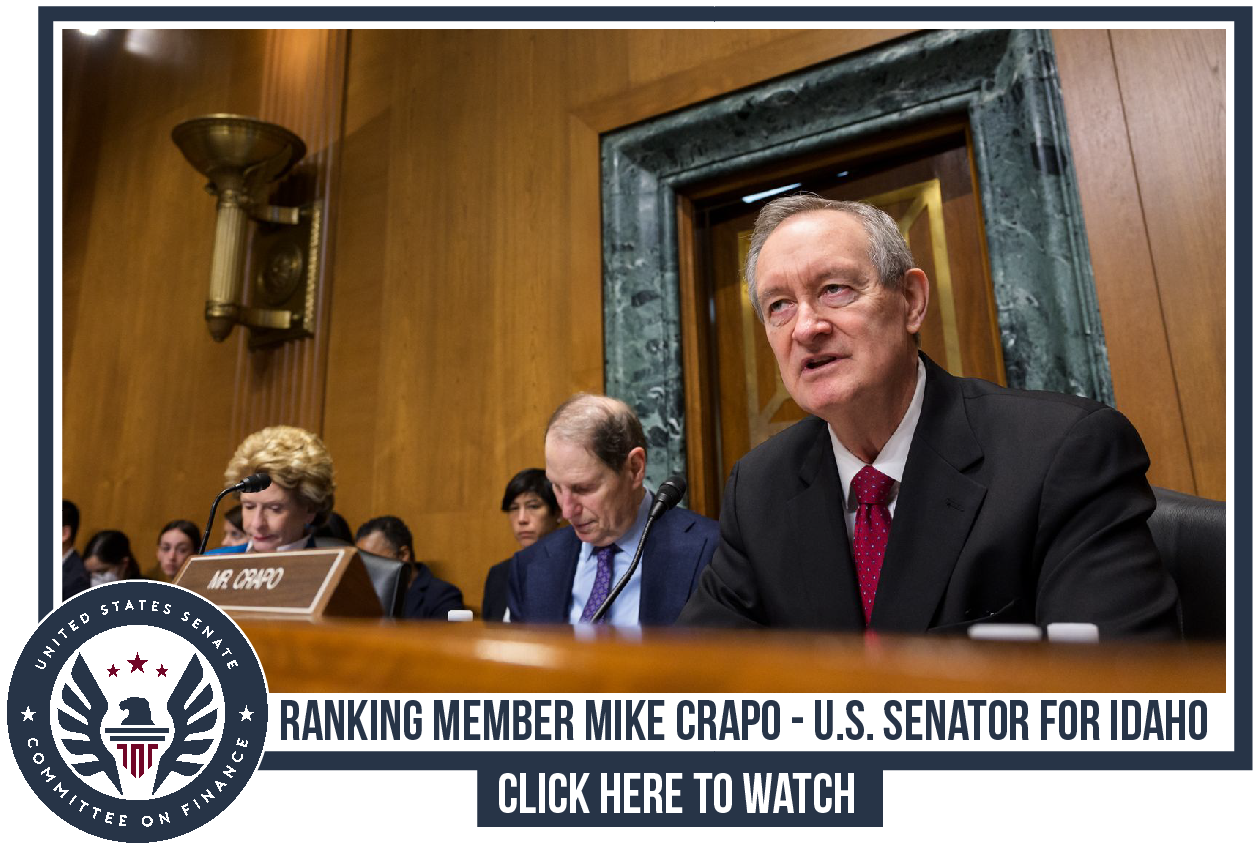Crapo: HHS Budget Risks Health Care Access, Choice and Affordability
Washington, D.C.--At a U.S. Senate Finance Committee hearing on the President’s FY2024 Health and Human Services (HHS) budget with Secretary Becerra, Ranking Member Mike Crapo (R-Idaho) highlighted concerns with the budget’s focus on partisan policies that risk harming health care access and affordability, for both current and future patients.
Crapo highlighted the innovation-killing price control expansion included in the partisan Inflation Reduction Act, pointing to projections made by congress’s nonpartisan scorekeeper that such an expansion would risk higher launch prices and distorted pricing practices. He also noted the budget’s claims of averting the Medicare Hospital Insurance Trust Fund’s looming insolvency through tax hikes and budget gimmicks, which would punish the job creators and entrepreneurs who drive the economy.

Click HERE to watch Senator Crapo's opening statement.
Crapo also highlighted concerns with Medicare beneficiaries’ access to accelerated approval drugs; changes to the Medicare Advantage risk model; and the need to protect seniors’ access to telehealth services.

Click HERE to watch Senator Crapo Question Secretary Becerra.
On the Administration’s innovation-stifling drug-pricing model:
The FDA’s accelerated approval pathway has provided a lifeline for countless Americans, advancing access to safe and effective medicines for cancer, rare diseases, and HIV, among countless other conditions—like Alzheimer’s--years before these treatments could otherwise come to market.
Unfortunately, this Administration has taken unprecedented steps to erode this pathway, deterring life-saving innovation and delaying access to care. This troubling trend began with CMS’s coverage restrictions for an entire class of potential Alzheimer’s therapies, and it seems set to continue with the recently announced Accelerating Clinical Evidence model, which would slash payments for treatments that rely on accelerated approval.
Secretary Becerra, I recently led a letter urging the Administration to abandon this misguided model, given the potential for a slower and slimmer pipeline of new medicines for seniors, among other serious concerns. I also wrote to you last year about the grave implications of the Alzheimer’s coverage decision. How does your Department plan to ensure that the accelerated approval pathway remains a robust and viable option for innovators and—most importantly—for patients?
On proposals that risk care disruptions and premium hikes for seniors:
CMS recently released their annual Advance Notice, which included some significant changes to the Medicare Advantage risk model for the upcoming bid process. We have heard multiple concerns from providers, patients and plans stating that these changes will disproportionately impact the most vulnerable MA beneficiaries, including those with low incomes or chronic conditions. Mr. Secretary, does the Administration these concerns and its final MA rule?
. . .
I encourage you to look at this carefully, and if you have not already done so, to conduct an impact analysis to determine how the model you are currently considering changes to would affect different beneficiaries. I think you will find that—once again—these proposals are going in the wrong direction.
On expanding telehealth:
As the budget request mentions, my colleagues and I came together late last year to advance a crucial two-year extension of a wide range of telehealth flexibilities, including for Medicare beneficiaries. Without further action, however, these policies will expire at the end of 2024, creating a coverage cliff for tens of millions of seniors across the country.
Secretary Becerra, I recognize this requires Congress to get involved, but from the Administration’s perspective, how should Medicare telehealth coverage look in the longer term—and can you commit to working with Congress to develop meaningful solutions that protect access well beyond the end of next year?
Next Article Previous Article
